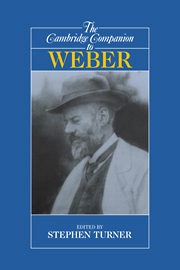Book contents
- Frontmatter
- Introduction
- PART I RATIONALITY, RATIONALIZATION, AND PSYCHOLOGY
- PART II POLITICS AND CULTURE
- PART III RELIGIONS AND THEIR ECONOMIC ETHICS
- PART IV LAW AND ECONOMICS
- 11 Max Weber as legal historian
- 12 From agrarian history to cross-cultural comparisons: Weber on Greco-Roman antiquity
- 13 Max Weber as economist and economic historian
- Further reading
- Index
13 - Max Weber as economist and economic historian
from PART IV - LAW AND ECONOMICS
Published online by Cambridge University Press: 28 May 2012
- Frontmatter
- Introduction
- PART I RATIONALITY, RATIONALIZATION, AND PSYCHOLOGY
- PART II POLITICS AND CULTURE
- PART III RELIGIONS AND THEIR ECONOMIC ETHICS
- PART IV LAW AND ECONOMICS
- 11 Max Weber as legal historian
- 12 From agrarian history to cross-cultural comparisons: Weber on Greco-Roman antiquity
- 13 Max Weber as economist and economic historian
- Further reading
- Index
Summary
Max Weber's publications and his intellectual influence were both enormous and wide-ranging. He was educated in the law, held two chairs in economics, and became one of the founders of the discipline of sociology. For his work in economic history he was considered to be one the major figures of the Younger Historical School in Germany, along with Arthur Spiethoff and his frequent intellectual disputant, Werner Sombart, with whom he often disagreed while sometimes working on similar historical problems. As a scholar, the nature of his concerns broadened over time, and shifted to what may be described as economic sociology. His contemporary Joseph Schumpeter described him as “a sociologist with a penchant for things that are primarily concerned with economics.” Schumpeter's laudatory and insightful memorial was written at the time of Weber's death. He later indicated that, although Weber's academic career began with chairs in economics, “he was not really an economist at all,” but rather a sociologist. Schumpeter distinguished between economic analysis, which “deals with the questions how people behave at any time and what the economic effects are they produce by so behaving,” and economic sociology, which “deals with the question how they came to behave as they do.” Economic sociology, according to Schumpeter, included the “analysis of economic institutions.” A recent collection of essays in economic sociology describes its core propositions as: “(1) economic action is a form of social action; (2) economic action is socially situated; and (3) economic institutions are social constructions.”
- Type
- Chapter
- Information
- The Cambridge Companion to Weber , pp. 256 - 271Publisher: Cambridge University PressPrint publication year: 2000
- 5
- Cited by



